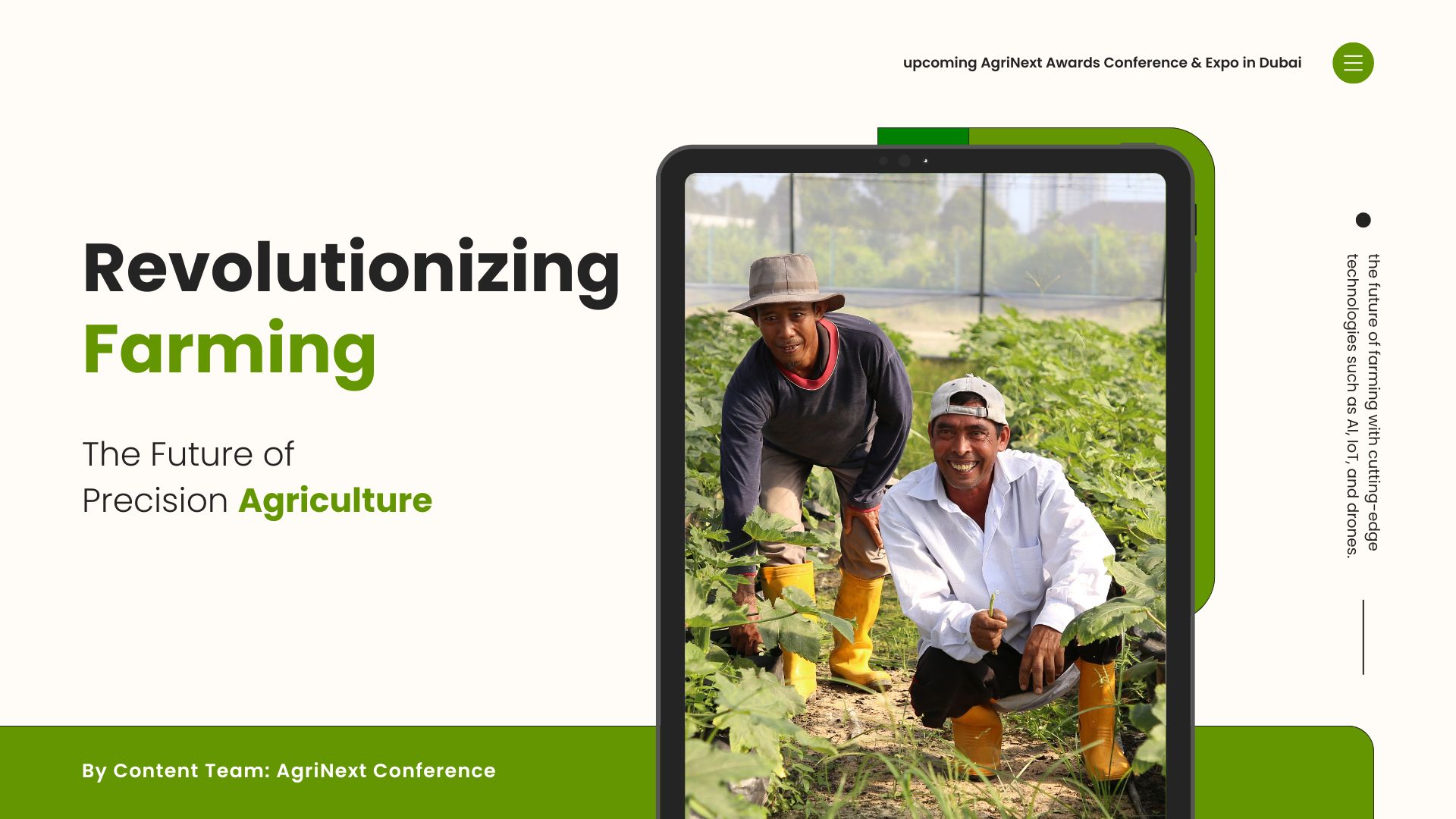
Introduction
Discover how precision agriculture is transforming the future of farming with cutting-edge technologies such as AI, IoT, and drones. As the global population continues to rise, and climate change impacts agricultural productivity, precision agriculture is crucial to ensuring food security and environmental sustainability.
At the upcoming AgriNext Awards Conference & Expo in Dubai, industry leaders and innovators will gather to showcase groundbreaking solutions that are revolutionizing farming. Learn how these advancements optimize yields, reduce waste, and promote eco-friendly practices.
“The intersection of agriculture and technology has the potential to be one of the most significant developments of our time. Precision agriculture is not just about using technology to farm more efficiently, it’s about using data to make better decisions that benefit the entire food chain.”
John Deere’s CEO, Samuel R. Allen
With that in mind, let’s explore the latest Trends and innovations in precision agriculture.
Latest Trends in Precision Agriculture
Artificial Intelligence (AI) and Machine Learning (ML)
AI and ML are revolutionizing the agricultural landscape by analyzing vast datasets collected from various sources, such as sensors, drones, and satellite imagery. With these tools, farmers can predict crop yields, optimize planting schedules, and identify the best irrigation and fertilization strategies. Machine learning algorithms also detect early signs of disease or pest infestations, allowing for timely interventions that can save entire harvests.
Example: AI systems, like IBM’s Watson Decision Platform for Agriculture, are helping farmers predict weather patterns and make more informed decisions about planting and harvesting.
Internet of Things (IoT)
IoT devices, including soil sensors, weather stations, and livestock trackers, provide real-time data that allows farmers to monitor environmental conditions such as soil moisture, temperature, and humidity. This data-driven approach ensures precise resource management, helping farmers apply the right amount of water, fertilizer, or pesticide at the right time, thereby reducing waste and optimizing yields.
Example: John Deere’s IoT-enabled tractors collect data from the field and communicate with other machines, improving efficiency and reducing overlap in tasks like planting and spraying.
Drone Technology
Drones are becoming an essential tool in precision agriculture, allowing for detailed aerial surveillance of crops. Equipped with high-resolution cameras and multispectral sensors, drones help farmers monitor plant health, detect water stress, and identify pest or disease hotspots. Some drones are even capable of automated planting or spraying, making them invaluable for precision tasks in large fields.
Example: Companies like DJI and AgEagle provide drones capable of real-time crop analysis, helping farmers make immediate adjustments to their farming practices.
At AgriNext 2024, the session on “Drones and Robotics in Precision Agriculture” will showcase how these technologies are transforming farming by enabling real-time monitoring and precise interventions.
Satellite Imagery
With advancements in satellite technology, high-resolution imagery is now more accessible to farmers. These images allow for monitoring of large agricultural areas over time, providing insights into crop health, soil conditions, and growth patterns. Satellite data can also help predict yield outcomes, optimize irrigation systems, and spot potential issues such as disease outbreaks or nutrient deficiencies early on.
Example: The European Space Agency’s (ESA) Copernicus program offers satellite data to monitor global agricultural trends, helping farmers with precision management of their crops.
Autonomous Farming
Automation is taking farming to the next level with autonomous tractors, planters, and harvesters. These machines use GPS and AI to operate with minimal human intervention, ensuring that tasks are completed with incredible precision. Not only does this reduce the labour required for farming, but it also optimizes the use of resources such as fuel, seeds, and fertilizers.
Example: Companies like Case IH and John Deere are developing fully autonomous tractors that can plant and harvest crops with minimal human oversight, reducing labour costs and increasing productivity.
Big Data Analytics
In precision agriculture, data is everything. By harnessing the power of big data analytics, farmers can aggregate and analyze information from multiple sources, including IoT devices, drones, and satellite images. This analysis provides actionable insights, such as predicting weather patterns, forecasting crop yields, and identifying optimal planting times. It allows farmers to make more informed decisions, ultimately increasing efficiency and profitability.
Example: Farmers Edge is a leader in big data analytics for agriculture, providing detailed insights that help farmers maximize their returns.
Sustainability and Environmental Stewardship
Precision agriculture isn’t just about optimizing yields and profits—it also plays a crucial role in promoting sustainability. By reducing water usage and minimizing the application of chemicals, precision farming practices help preserve natural resources and protect the environment.
Techniques such as variable rate technology (VRT) enable farmers to apply inputs like water, fertilizers, and pesticides in precisely the right amounts, reducing waste and mitigating the harmful effects of agricultural runoff on ecosystems.
Example: Precision irrigation systems, such as those offered by Netafim, reduce water usage by delivering moisture only to the areas that need it most, conserving water and improving crop health.
Companies like Algofait, known for their innovative aquaculture solutions, will be featured at AgriNext Conference & Expo 2024. They lead the way in eco-friendly practices, focusing on automated farming systems that conserve resources and enhance sustainability.
Conclusion
Precision agriculture truly revolutionized farming by integrating advanced technologies to create more sustainable, productive, and profitable agricultural systems. From AI and machine learning to drones and big data analytics, these innovations are empowering farmers to work smarter, not harder.
As the world faces increasing pressure to produce more food while reducing environmental impact, precision agriculture offers a promising path forward, ensuring that farmers can meet the challenges of tomorrow while protecting the planet for future generations.
If you want to witness these advancements firsthand and learn from industry experts, AgriNext Awards Conference & Expo 2024 is the perfect platform. Taking place in Dubai, this event will bring together global leaders in precision farming, offering a glimpse into the future of agriculture. Abdel Rahman Alzubaidi, CEO of Ivvest, will speak on AI’s transformative role in agriculture, particularly in predictive analytics and resource optimization.
Don’t miss the opportunity to explore the latest innovations, network with experts, and shape the future of farming.
Signup For AgriNext Conference Newsletter


